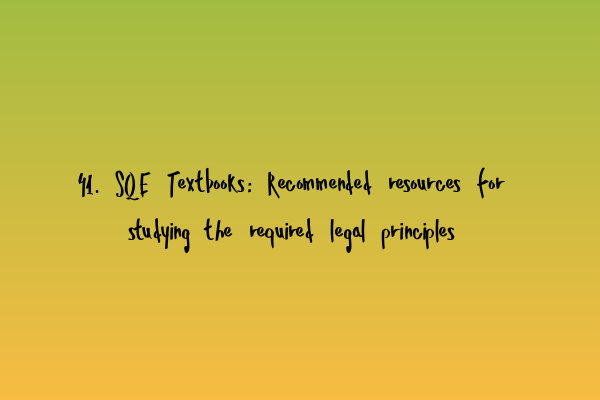41. SQE Textbooks: Recommended resources for studying the required legal principles
Preparing for the Solicitors Qualifying Examination (SQE) requires a comprehensive understanding of the required legal principles. With so much information to cover, it’s essential to have the right resources at your disposal. In this article, we will discuss the recommended textbooks that can help you study effectively for the SQE and ensure exam success.
1. SQE Recommended Textbooks
There are several textbooks available that cover the legal principles required for the SQE. These resources are written by experienced legal professionals and provide in-depth explanations and analysis of the relevant legal topics. Some of the recommended textbooks include:
1. Textbook 1: This comprehensive guide covers all the foundational legal principles required for the SQE. It provides detailed explanations of key concepts and includes practice questions to test your understanding.
2. Textbook 2: This textbook focuses on the practical application of legal principles. It provides real-world examples and case studies to help you develop critical thinking and problem-solving skills.
3. Textbook 3: This resource is specifically designed to cover advanced legal principles. It goes beyond the basics and delves into complex legal concepts, making it ideal for those aiming to achieve a higher level of understanding.
2. Benefits of Using SQE Textbooks
Using SQE textbooks has several advantages when it comes to preparing for the exam:
1. Comprehensive Coverage: SQE textbooks are designed to cover the full range of legal principles required for the exam. They provide a structured approach to studying, ensuring that you don’t miss any important topics.
2. Clarity and Simplicity: These textbooks are written in a clear and concise manner, making it easier for you to grasp complex legal concepts. The authors break down the information into easily digestible chunks, enhancing your understanding and retention.
3. Practice Questions: Many SQE textbooks include practice questions and mock exams. These allow you to test your knowledge and identify areas where you may need additional study. Practicing with exam-style questions will also familiarize you with the format and improve your time management skills.
3. How to Use SQE Textbooks Effectively
While having the right textbooks is crucial, utilizing them effectively is equally important. Here are some tips to make the most out of your SQE textbooks:
1. Create a Study Plan: Plan your study schedule in advance and allocate specific time slots for each topic. This will help you stay organized and ensure that you cover all the required material.
2. Read Actively: Don’t simply skim through the material. Engage with the text by highlighting key points, making notes, and summarizing the information in your own words. This active reading approach enhances comprehension and promotes retention.
3. Complete Practice Questions: Work through the practice questions provided in the textbooks and take advantage of any accompanying online resources or supplementary materials. Use these questions to test your knowledge and identify areas for improvement.
4. Review and Revise: Regularly review the material you’ve covered to reinforce your understanding. Allocate time for revision in your study plan to ensure that you retain the information effectively.
By following these strategies and utilizing SQE textbooks, you will be well-equipped to study the required legal principles and excel in the SQE exam.
For additional resources on preparing for the SQE, check out these related articles:
– Conquer the Multiple Choice Questions (MCQ) in SQE1
– Interactive mock tests for SQE: Enhancing engagement and learning
– SQE Sample Papers: Practice for Exam Success
– Focus Areas in SQE1 and SQE2: Mastering Key Concepts
– Adjusting Your SQE Strategy Based on Mock Performance
